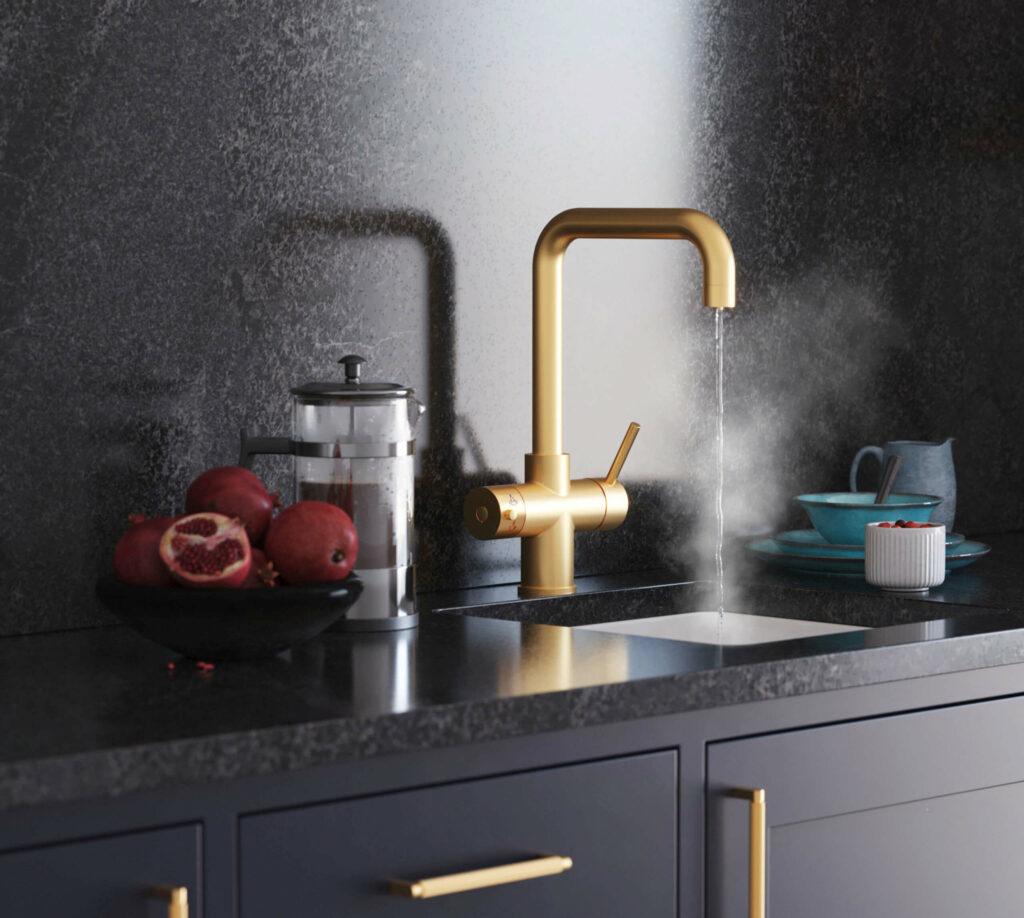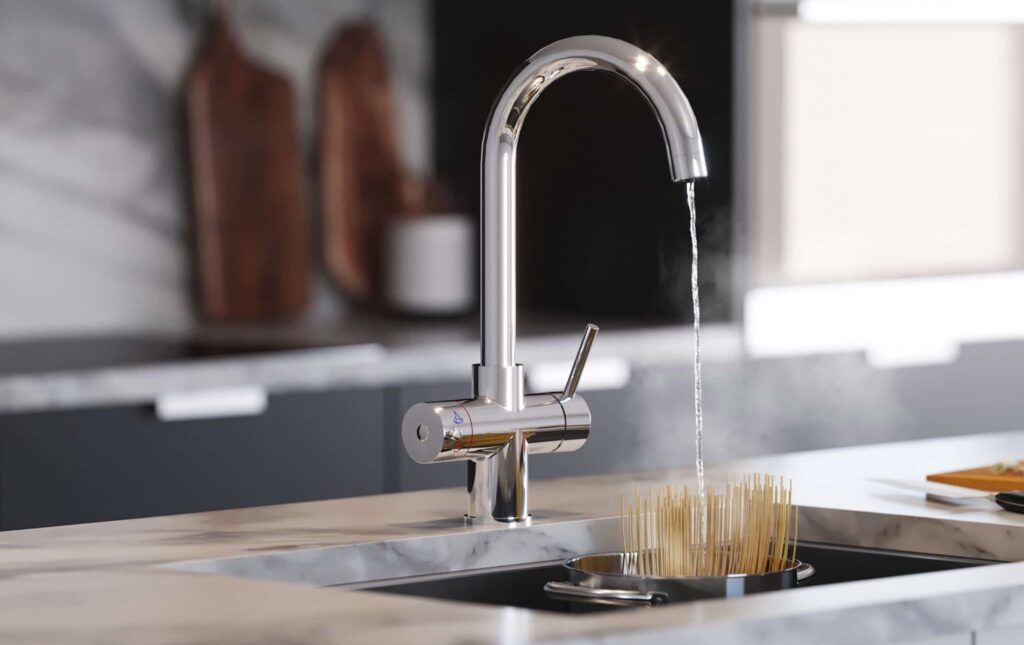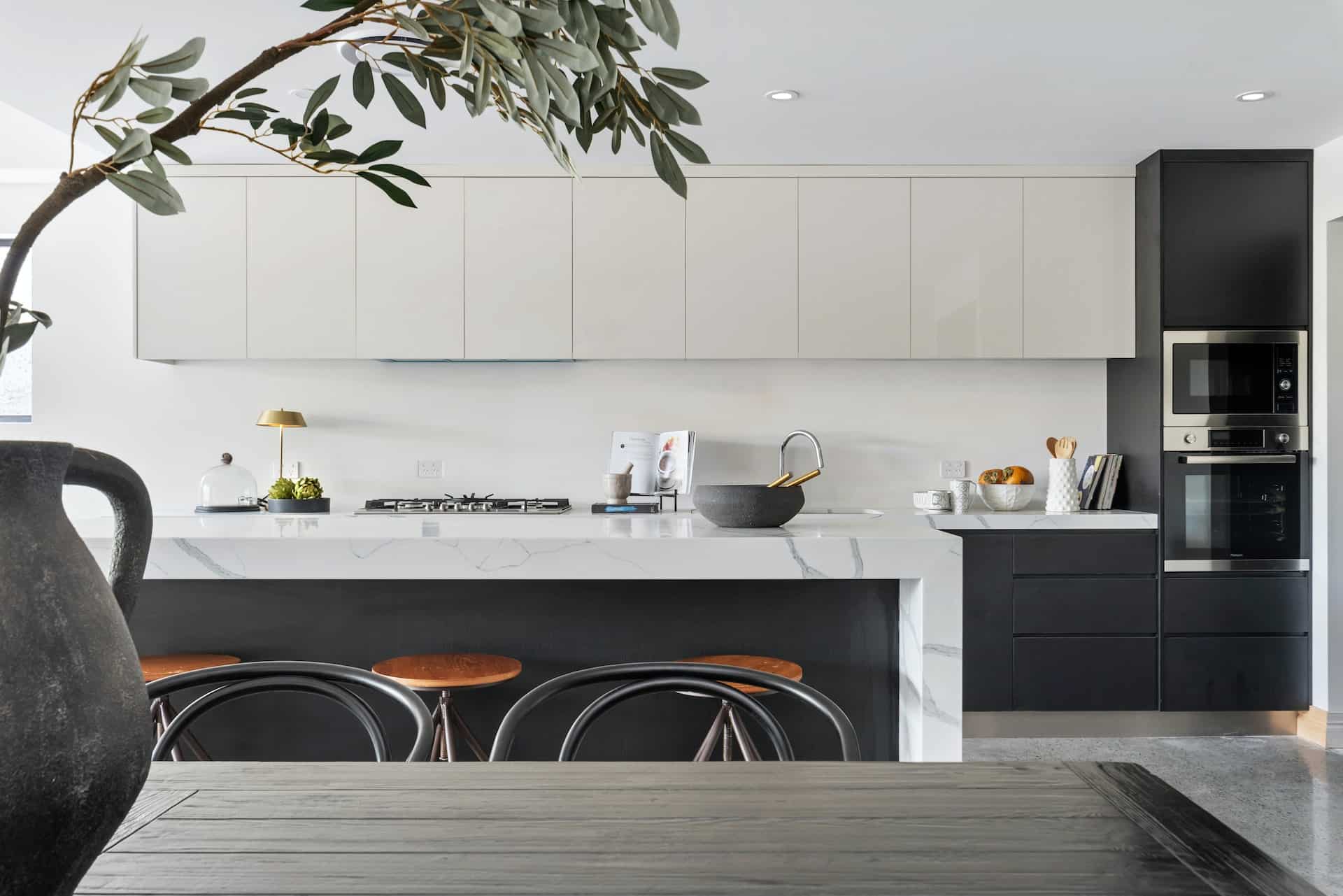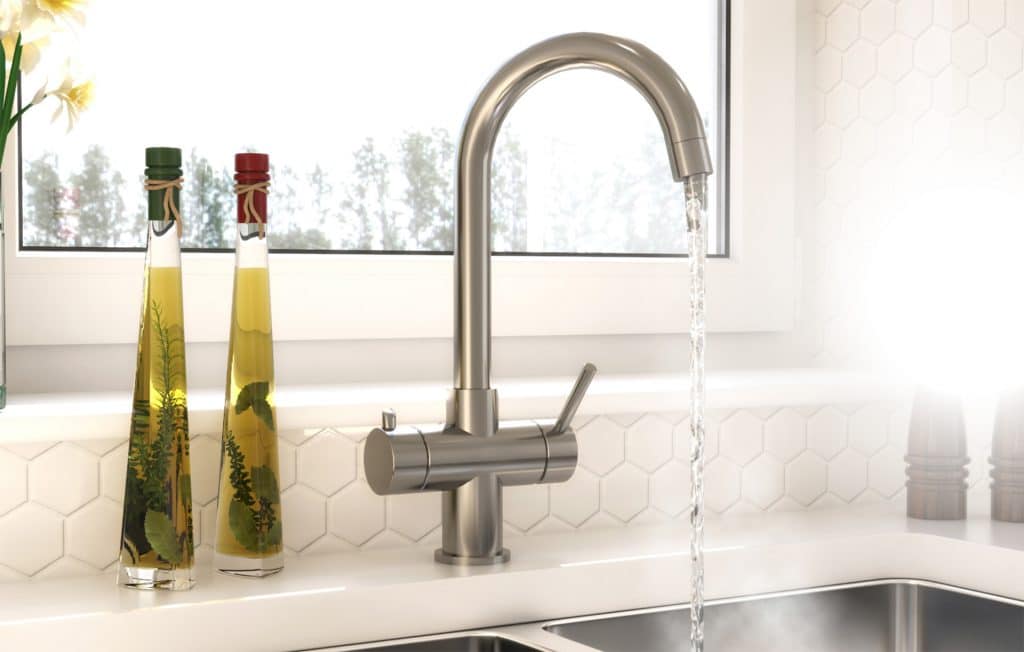Boiling Water Taps: A Guide to Costs, Types, Installation & More

Boiling water taps (also called 'instant hot water taps') are fast becoming the must-have appliance in British kitchens, offering next-level convenience for homeowners. If you're thinking of buying one for your kitchen, in this guide we hope to answer your most-asked questions about the costs, benefits and more.
How do boiling water taps work?
Boiling water taps, also known as '3-in-1' or '4-in-1' taps, provide instant boiling water with just a turn of a handle. This is made possible by a boiler tank installed under your sink which keeps a supply of water at a boiling hot temperature, ready for use at any time.
Most boiling water taps come with a filter for the boiling water. This filter removes impurities and carbon, ensuring that the water that comes out of the tap is clean and safe to consume.
While most boiling water taps connect to your mains supply and can dispense hot, cold, and boiling water from a single spout, there are some models that only provide boiling water. If you opt for one of these models, you'll need to keep your mains-supplied tap for regular hot and cold water.
The tank for a boiling water tap is connected to both your mains and your water supply. It heats up the water and maintains it at the right temperature, so hot water is instantly available whenever you turn on the tap.
Read more about how these taps work here.
Other names for boiling water taps
The terminology around these taps can seem confusing for beginners, particularly when brands use a range of different terms for the same thing. In our experience, the following terms all mean the same thing:
- Boiling water taps
- Instant hot water taps
- Hot water taps
- Instant boiling taps
- Boiler taps
When a tap contains 2-in-1, 3-in-1, 4-in-1 or 5-in-1 in its name, the first number refers to the number of features it has. More about that below.
Types of boiling water tap
There are generally four types of boiling water taps:
- Boiling-only taps only dispense boiling water, which means you will need to keep your other tap for regular hot and cold water
- 2-in-1 taps usually do not dispense boiling water, instead, they have a pull-out ('flex') spout with regular hot/cold mixer functionality
- 3-in-1 taps dispense regular hot and cold water, along with filtered boiling water
- 4-in-1 taps dispense regular hot and cold water, filtered boiling water and filtered cold water
- Flex taps can be 3-in-1 or 4-in-1, but they always have a pull-out spout. Sometimes 4-in-1 taps with a flex spout are called '5-in-1 taps'
Learn more about the difference between our taps here.
The benefits of boiling water taps
There's a reason for boiling water taps becoming as popular as they are:
-
Instant Boiling Water: With a boiling water tap, you have access to boiling water on demand, eliminating the need to wait for water to boil on the stove or in a kettle. This feature can save you considerable time, especially when cooking or making hot beverages.
-
Declutter Your Workspace: These taps can help declutter your kitchen space by replacing the need for a kettle, freeing up more room on your counters.
-
Energy Efficiency: Boiling water taps can help you save on your energy bills and reduce your carbon footprint. They only heat the amount of water you need, cutting down on the energy waste associated with boiling a kettle.
-
Safety: Boiling water taps are generally safer than kettles. Being in a fixed position, they don't have a cable that can be tripped over, and many models come with safety features such as child locks.
-
Improved Taste of Water: Some boiling water taps come with a filter that can improve the taste and smell of the water by removing impurities.
-
Convenience: These taps are incredibly useful for everyday cooking and cleaning tasks like brewing hot drinks, cooking pasta or vegetables, mopping floors, or filling up hot water bottles.
-
Aesthetics: Boiling water taps come in a wide range of finishes and styles, making them an attractive addition to most kitchen interiors.
-
Cost-Effective: While the upfront cost can be high, boiling water taps are affordable to run and straightforward to install, potentially saving you money in the long run.
How much does a boiling water tap cost?
The cost of a boiling water tap can vary significantly depending on the brand, model, and additional features. While some taps can still cost upwards of £1,000, there are more affordable options available. For instance, the Chrome Avista 3-in-1 tap from Hot Water Taps is priced at £259 (as of September 2023).
4-in-1 taps, which include a cold water filter, tend to be more expensive than 3-in-1 models. Flex taps, which offer flexible pull-out hoses for easier use, also vary in price but are generally pricier than a basic 3-in-1 tap.
Additionally, if you need to hire a plumber to install your tap, this could cost between £50 and £100, depending on the complexity of the job and the specific tap model.
To ensure your boiling water tap continues to operate efficiently, it is recommended that you change the filter every six months. The cost of a replacement filter can vary, but for Hot Water Taps, it's priced at £29.95.
How much do boiling water taps cost to run?
Boiling water taps are designed to operate efficiently, making them less expensive to run than many people might assume. Thanks to an insulated boiler tank, these taps require minimal energy to maintain a high water temperature. On average, the running cost of a boiling water tap is estimated to be between 10p and 15p per day.
In contrast, the cost to boil a kettle can range from 2p to 6p each time, depending on the brand and the amount of water being heated. Therefore, if you frequently boil water using a kettle throughout the day, the cost difference in your energy bills between using a kettle and a boiling water tap might not be significant.
Are boiling water taps safe?
Boiling water taps are generally safe to use, even in homes with children. Manufacturers have incorporated safety mechanisms into their designs to prevent accidental burns from boiling water. For instance, some taps are equipped with a spring-loaded mechanism that automatically shuts off the boiling water function when not supervised. Moreover, the spouts of these taps are insulated to prevent them from becoming too hot to touch.
Compared to kettles, boiling water taps can be a safer alternative. Kettles can pose a risk of burns or spills if mishandled, especially by elderly individuals or children. Additionally, hot water can splutter out of a kettle's spout, presenting another potential hazard.
However, it's important to note that while boiling water taps are designed for safety, they should still be used with care, especially around young children. Learn more about kitchen safety here.
WRAS-approved products
To ensure your new tap has passed safety regulations, we recommend looking for WRAS-approved products. The Water Regulations Approval Scheme is an independent UK certification body, that independently tests products like boiling water taps to ensure they're safe for the public.
Installing a boiling water tap
Installation is pretty straightforward, though sometimes a plumber is needed if you're inexperienced - this could cost between £50 and £100.
To install a boiling water tap, you will need to fit the boiler tank and filter in your kitchen cabinet, requiring a plug socket and basic electrical and/or plumbing knowledge. This is pretty straightforward and you can find demonstration videos on our YouTube channel.
Boiler tanks
Boiler tanks range in size from 2 to 7 litres, so it's worth checking the dimensions to see how much space you have available in your cupboard. Our boiler tanks are 2.4 litres, dispensing 6-7 cups of instant boiling water at a time. Because the tank only takes 4 minutes to reheat, it's not usually necessary to choose a bigger boiler tank than that, however, we now offer a 4-litre tank upgrade for just £99, drastically increasing its capacity and ensuring you never run out when you're cooking or brewing tea for the in-laws at your next family function.
Water pressure
The operating water pressure of our taps is between 0.5 to 5.0 bar, though this may vary for other brands, so bear this in mind before installation. If your water pressure is too low, you should speak to a plumber before ordering and installing your boiling water tap. Trying to operate a tap out of the provided maximum/minimum can be dangerous and cause issues with your new tap.
Warranty
The process is generally hassle-free, and you are often covered by warranty should there be a defect with the product. We are proud to offer one of the longest warranties on the market, with 2 years for your tank and 5 years for your tap. It is important that you check the conditions for your warranty to ensure you meet any specific requirements, such as changing your filter regularly.
Maintaining an instant boiling water tap
Maintenance is pretty straightforward, requiring regular cleaning just like any other tap. This can be done with a gentle soapy mixture and doesn't require a special cleaner. In fact, harsh cleaners can actually damage the finish on your tap - so you should avoid bleaches, rough scrubbers or harsh detergents. As it's an electrical appliance, it should be inspected once every month or so for leaks or defects, particularly around the boiler tank and filter. If any leaks or defects are spotted, you should turn your boiler tank off at the wall and seek the opinion of a professional (either your local plumber or ourselves).
Learn more about maintaining your tap here.
Should I turn my boiling water tap off at night?
We don't recommend turning your boiling water tap off at night, as it will consume more energy reheating than simply leaving it on. If it will be unused for over a week (for example, if you are going away on holiday), you can switch it off at the socket to preserve energy, draining and refilling it when you return. You should also turn your tap off if the room it's in will be subjected to sub-zero temperatures, which won't apply to the vast majority of properties.
Do boiling water taps heat to 100°C?
Most taps on the market don't dispense 100°C, instead dispensing water that is a couple of degrees cooler. This accounts for heat loss when the water is run through the spout. However, this makes little difference when it comes to cooking and cleaning; in fact, many hot drinks like tea and coffee should be brewed below 100°C, and a cold steel saucepan will sap a few degrees of heat from boiling water on contact anyway.
Which boiling water tap should I buy?
We have four models, which each come with a variety of different spout styles and colours, including black, gold, nickel, gunmetal, chrome and copper. Our models are:
- Avista - our most affordable 3-in-1 tap
- Athena - our premium 3-in-1 tap
- Astra - our 3-in-1 tap with a pull-out spout
- Quantum - our best-selling 4-in-1 tap
- Platinum - our 4-in-1 tap with a pull-spout
Are boiling water taps suitable for offices?
Boiling water taps are becoming increasingly popular in offices, as they provide a convenient and efficient way to make hot drinks or prepare snacks for employees. They are also commonly used in staff kitchens as they save time and energy compared to traditional kettles or boiling water from a stovetop.
When choosing a boiling water tap for an office setting, it is important to consider the size of the tank and the water pressure requirements, as well as any warranty and maintenance plans offered by the manufacturer. Additionally, some models may be more suitable for high-volume usage in an office than others, so it's worth doing thorough research to find the best fit for your workplace.
Read our guide to using boiling water taps in offices.
Do you have any lingering questions about our taps? Get in touch with our team to find out more.




